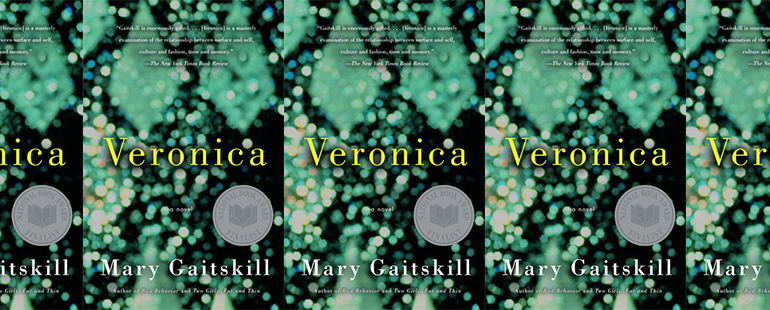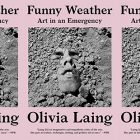Friendship and Redemption in Veronica
 In contemporary literature, Mary Gaitskill stands out for her unapologetically sexual and taboo themes—prostitution and sadomasochism being just the most obvious examples. Her work is easily characterized as gritty and explicit; it also, however, offers nuance and heart while considering questions of how people pursue pleasure and at what cost. Take Gaitskill’s 2006 novel, Veronica—a finalist for the National Book Award and National Book Critics Circle Award, which follows Alison, an on-again-off-again model as she searches for “life and sex and cruelty. Not something you learn in community college.” Alison’s experiences of joy and pain leave her emotionally isolated and unable to form relationships until she befriends Veronica. Through her, Alison is able to make peace with her past, and what emerges from the novel is a surprising conviction in the redemptive power of kindness, compassion, and friendship.
In contemporary literature, Mary Gaitskill stands out for her unapologetically sexual and taboo themes—prostitution and sadomasochism being just the most obvious examples. Her work is easily characterized as gritty and explicit; it also, however, offers nuance and heart while considering questions of how people pursue pleasure and at what cost. Take Gaitskill’s 2006 novel, Veronica—a finalist for the National Book Award and National Book Critics Circle Award, which follows Alison, an on-again-off-again model as she searches for “life and sex and cruelty. Not something you learn in community college.” Alison’s experiences of joy and pain leave her emotionally isolated and unable to form relationships until she befriends Veronica. Through her, Alison is able to make peace with her past, and what emerges from the novel is a surprising conviction in the redemptive power of kindness, compassion, and friendship.
As a teenager, Alison runs away from her home in New Jersey and makes her way to San Francisco, where she lives in a hostel with crowds of other runaways and sells flowers outside go-go clubs for money. After several months, her itinerant existence changes when a “modeling agent” drops his card in her flower basket and arranges a meeting and initial photo shoot. Alison goes, but during the session feels that she “didn’t know how to pose, but it didn’t matter; the music was like a big red flower you could disappear into. . .instead of being embarrassing, it was great.” This is the excitement of a young person discovering something they’re good at, and it makes Alison want “to be a model and make money walking around inside songs everybody knew.” Through modeling, Alison’s focuses her life on a desire—one that will continue to guide her throughout the novel, despite its immediate and long-term repercussions.
Years later, Alison will tell Veronica that she got into modeling “‘by fucking a nobody catalog agent who grabbed my crotch.’” Alison is around seventeen when she falls prey to this age-old scam, and she recalls the moment multiple times over the course of the novel, each time in slightly different forms. Her alternations give the impression that even decades later she is trying to find the right words for what happened. Her bluster in speaking with Veronica is an obvious part of this struggle, which Veronica sees right through. She tells Alison that “‘every pretty girl has a story like that, hon. . .I don’t have to do that anymore, though. It’s my show now.’ And she turned into a movie star, strutting past me while I gawked.” Alison would like to seem too worldly and jaded to be taken by surprise, but Veronica manages the trick anyway. It is just the beginning of what Alison has to learn from her.
Soon after, we learn that though the agent Alison met was mostly a fraud, the photos he had taken have won a magazine contest, which gives her a chance to model in Paris. Driven by the promise of a new life, Alison boards a plane without hesitation. In Paris, she quickly establishes herself as a sought-after model and becomes the mistress of a powerful agent, Alain. Having achieved the life she wanted, Alison then becomes largely disengaged—a spectator to both ugliness and beauty. When she witnesses a photographer bully a fifteen-year-old model, telling her “to put her hand down her pants and masturbate,” she does not react. She merely watches the situation unfold, thinking that “even a young girl’s shame can be beautiful.”
Alison is not wrong about the uncomfortable truths about sexuality and appeal, but it’s clear she is moving in circles where people have only external value. She might have “loved the rich things and the money and people kissing my ass. I loved the song I was living in,” but her position is inevitably tenuous. When Alain loses interest in her, she makes a public scene that leads him to lock her apartment and steal her modeling money. With nowhere to turn, she returns to New Jersey and does her best to rebuild her life. She takes classes at a community college and moves back home, but all her longing remains focused on Paris. For her, “during the day, life stood stolid, gray and oblivious. But at night, heaven came in the cracks. I would want Alain and want his cruelty, too.” Once again, Alison is driven by desire, and this time it leads her fruitlessly in the direction of her past. She leaves home again and goes to New York, reentering a world in which [people] looked at me as an object with specific functions, because that’s how I looked at [them]. . .I could only fix that person in my imagination and turn him this way and that.” As a result of her objectification, Alison cannot appreciate people as anything but a means to an end. She is left “raw and tired,” but unable to change.
After moving to New York, Alison takes odd jobs where she can and at one of them sees Veronica. At first, Alison views the “plump thirty-seven year-old with bleached-blond hair [who] wore tailored suits in mannish plaids with matching bow ties, bright red lipstick, false red fingernails” who appears before her with indifference. Although not a promising start to a relationship, indifference is arguably a step above the active exploitation Alison usually practices. “I did not fix Veronica in my mind or turn her this way and that, because I didn’t care about her,” she says. “I was not interested in her, but I was curious about her, like I might be curious about an elaborate object.” Though she still sees Veronica as an object rather than a person, Alison “was tolerant enough to. . .listen to her talk about her movies, her six seal-point Siamese cats, and her bisexual boyfriend, Duncan.” It soon becomes clear that Veronica is a figure of some comedy and character, and while her odd ways would have no currency in Paris, Alison gradually falls under their sway. Veronica surprises Alison, makes her curious, and their relationship is built on these newfound emotions.
At one point, Alison discovers that Veronica is the sort of person capable of saying, “‘my rapist was very tender.’” In Alison’s assessment, “if he’d had a flash of tenderness anywhere in him, a memory of his mother, of himself as a baby, of a toy, [Veronica] would’ve felt it. . .she would’ve sought it.” This is Veronica’s gift, to offer tenderness and kindness in even the darkest of situations, and Alison benefits from this characteristic as well. Once, when Alison relates a story about Alain, and she “didn’t know the gentleness of [Veronica’s] eyes. . .Unknowing, I took comfort. . . Maybe I was able to feel the comfort because I half-despised it. I don’t know. But it helped me to forgive Alain.” Before this moment with Veronica, there was no possibility of forgiveness for Alain. Alison had regarded him as a means to heaven or as the fearful instrument of her downfall. Veronica’s insistence on recognizing each person’s humanity deeply affects Alison and causes her to humanize Alain as well, freeing her from some of her painful past.
Alison and Veronica’s relationship comes to a head when Veronica’s boyfriend is diagnosed with HIV and Veronica tests positive as well. Veronica’s loss and diagnosis are tragic, but, surprising nearly everyone, Alison does not abandon Veronica at this critical juncture. Even after she moves to Los Angeles for work, Alison is there for Veronica, telling her, “I want to see you. I want to help. I can get a flight tomorrow. . .Let me come. If you really don’t want me to, I won’t. but I want to. . .I love you.” This offer represents an extraordinary shift for Alison. Instead of seeing what Veronica can do for her, Alison thinks only of what she can do for Veronica. The love she expresses is not the same love that she had for life in Paris; it has real care and concern behind it. Alison has absorbed the compassion Veronica showed her and is able to return it in a true show of friendship.
Friendship has many different definitions and forms, but it takes a writer like Gaitskill, with deep knowledge of life’s unpleasant side, to remind us what it can mean for two lost souls to find each other. Because of Veronica, Alison believes that even though she had “sank down into the darkness and lived among the demons for a long, long time. . .I was saved by another demon who looked on me with pity and so became human again. And because I pitied her in turn, I was allowed to become human, too.” In the end, despite the difficulties in her own life, Alison views this redemption with “gratitude and joy,” accepting it as a gift given rather than sought.



